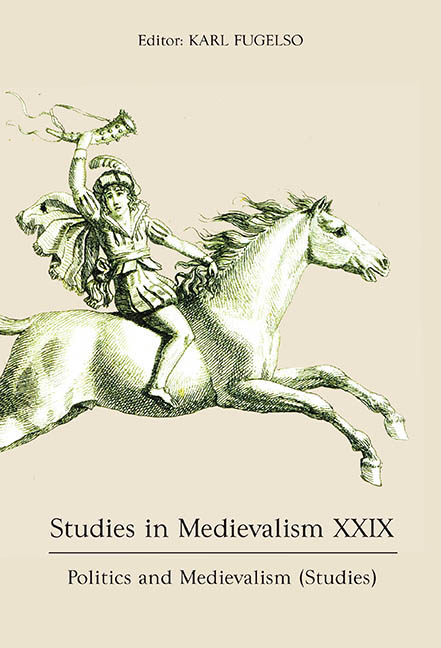Book contents
- Frontmatter
- Studies in Medievalism
- Acknowledgments
- Contents
- List of Illustrations
- Preface
- I Essays on Politics and Medievalism (Studies)
- Historical Malapropism and the Medieval Blood Libel in American Politics
- Putin’s Medieval Weapons in the War against Ukraine
- The Battle of Tours and the US Southern Border
- Medievalism, Brexit, and the Myth of Nations
- An Arthur for the Brexit Era: Joe Cornish’s The Kid Who Would be King
- II Other Responses to Medievalism
- Angle-ing for Arthur: Erasing the Welsh in Guy Ritchie’s King Arthur: Legend of the Sword
- Chasing Freyja: Rape, Immigration, and the Medieval in Alt-Right Discourse
- “Things painted on the coarse canvas”: Political Polemic in Jean-Paul Laurens’s Portrait of the Child Emperor Honorius
- Longfellow and Old English
- Archaeology and Medievalism at Julian of Norwich’s Anchorite Cell
- A Revelation of Love: Christianity, Julian of Norwich, and Medieval Pity in the Harry Potter Series
- In the Beginning Was the Word: How Medieval Text Became Fantasy Maps
- Objectivity, Impossibility, and Laughter in Doctor Who’s “Robot of Sherwood”
- Sonic Medievalism, World Building, and Cultural Identity in Fantasy Video Games
- Contributors
- Miscellaneous Endmatter
Medievalism, Brexit, and the Myth of Nations
Published online by Cambridge University Press: 19 August 2020
- Frontmatter
- Studies in Medievalism
- Acknowledgments
- Contents
- List of Illustrations
- Preface
- I Essays on Politics and Medievalism (Studies)
- Historical Malapropism and the Medieval Blood Libel in American Politics
- Putin’s Medieval Weapons in the War against Ukraine
- The Battle of Tours and the US Southern Border
- Medievalism, Brexit, and the Myth of Nations
- An Arthur for the Brexit Era: Joe Cornish’s The Kid Who Would be King
- II Other Responses to Medievalism
- Angle-ing for Arthur: Erasing the Welsh in Guy Ritchie’s King Arthur: Legend of the Sword
- Chasing Freyja: Rape, Immigration, and the Medieval in Alt-Right Discourse
- “Things painted on the coarse canvas”: Political Polemic in Jean-Paul Laurens’s Portrait of the Child Emperor Honorius
- Longfellow and Old English
- Archaeology and Medievalism at Julian of Norwich’s Anchorite Cell
- A Revelation of Love: Christianity, Julian of Norwich, and Medieval Pity in the Harry Potter Series
- In the Beginning Was the Word: How Medieval Text Became Fantasy Maps
- Objectivity, Impossibility, and Laughter in Doctor Who’s “Robot of Sherwood”
- Sonic Medievalism, World Building, and Cultural Identity in Fantasy Video Games
- Contributors
- Miscellaneous Endmatter
Summary
Almost twenty years ago, in The Myth of Nations, Patrick Geary wrote of a crisis of European identity in the fallout from the end of the Cold War. Describing the new contours of Europe amid a turbulent series of revolutions and national conflicts, Geary takes a particularly long view of the emergence of a European identity and the emergence of national consciousness as – in part – a product of the European Middle Ages. Bringing his ideas to bear on the (then contemporary) European conflicts, Geary describes how the new models of national consciousness often unwittingly used medieval ideas of national borders to underpin modern concerns about independence, with new nation-states emerging from the wreckage of a twentieth-century reconfiguration of Europe. Witnessing the emergence of separatist movements within and across those nation-states, the rise of micro-nationalism, and the widespread fear of instability and apparently revived Barbarian hordes, Geary observed that the medieval period “has become the fulcrum of political discourse across much of Europe.”
Geary's argument is predicated on the importance of an idea of Europe that lies at the heart of any nationalist project, which leads eventually to the reimagination of the nation and the national as part of an imagined community, as Benedict Anderson terms it. The effect of this reimagining is the assertion of the individual sovereignty of nations. Geary identifies language as one such pillar on which an idea of ethnic identity can be constructed: it is disturbing, he writes (in 2002), to see:
the very great extent to which the international community, including even pluralistic societies such as the United States, accepts the basic premises that peoples exist as objective phenomena and that the very existence of a people gives it the right to self-government. In other words, we assume that, somehow, political and cultural identity are and have a right to be united.
Geary's arguments are by no means alone in this area. In his discussion of the emergence of Europe, Robert Bartlett similarly noted that for medievalists and politicians alike, nations are not concrete objects but, rather, “Europe is both a region and an idea.”
- Type
- Chapter
- Information
- Studies in Medievalism XXIXPolitics and Medievalism (Studies), pp. 31 - 38Publisher: Boydell & BrewerPrint publication year: 2020



